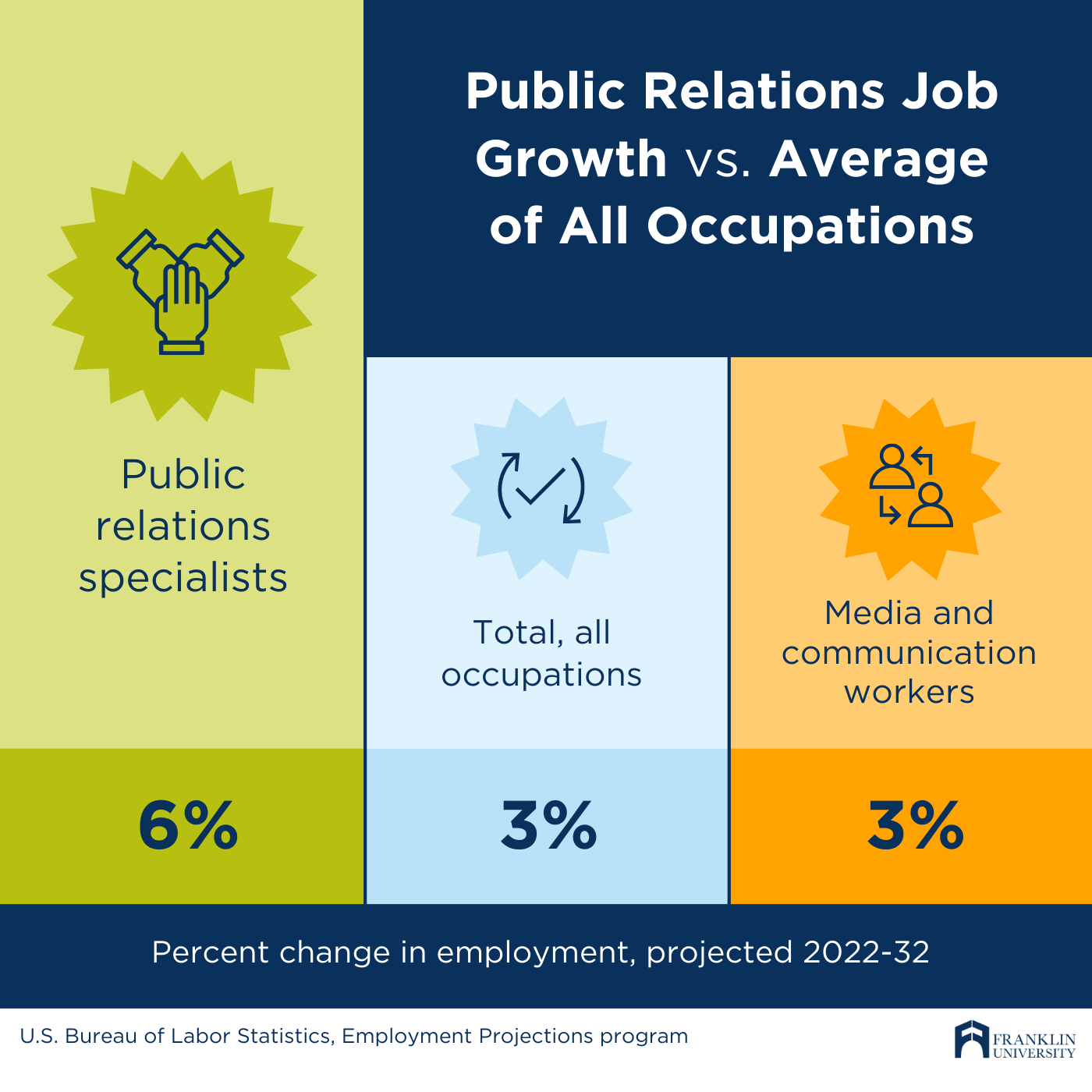Request Information
We're Sorry
There was an unexpected error with the form (your web browser was unable to retrieve some required data from our servers). This kind of error may occur if you have temporarily lost your internet connection. If you're able to verify that your internet connection is stable and the error persists, the Franklin University Help Desk is available to assist you at helpdesk@franklin.edu, 614.947.6682 (local), or 1.866.435.7006 (toll free).
Just a moment while we process your submission.

Is a Public Relations Degree Right for Me?
A career in public relations is a lot like ice cream: lots of variety and something for just about everyone. The work is interesting, the pace is fast, and no two days are alike.
And, thanks to new technologies and media platforms, the field of public relations and the careers of PR practitioners is changing and growing like never before. In fact, according to the U.S. Bureau of Labor Statistics (BLS), the occupational outlook for public relations specialists is growing at 8%, which is faster than the average of all occupations (3%).

When it comes to paying for school, grants are among your best options. But do you know how to find them? Remove the guesswork by downloading this free guide
To help you decide if a degree in public relations is right for you, here’s a look at PR degrees and careers, including what public relations is, what you can expect from an online public relations degree program and, most importantly, which questions to ask yourself to help you figure out if a public relations degree fits your career goals, lifestyle and future plans.
What Is a Public Relations Degree?
A public relations degree can prepare you to work as a PR practitioner within a corporate environment, nonprofit organization, government agency, public relations firm or sports organization.
According to the Public Relations Society of America (PRSA), public relations is “a strategic communication process that builds mutually beneficial relationships between organizations and their publics.” As the field continues to evolve, PR practitioners are likely to find themselves helping to shape and influence public perception of an organization through engagement, relationship building, and other best practice techniques.
In addition to undergraduate-level programs, some colleges and universities offer masters and doctoral degree programs in PR.
What Can I Do with a Public Relations Degree?
As an in-demand career, there are plenty of opportunities for those with a public relations degree to work in all aspects of communications. In addition to public relations specialist, the Bureau of Labor Statistics has a list of similar job titles:
.png)
What’s the Expected Salary for PR Specialists?
Like other careers, the salary range for public relations professionals depends on a number of factors, including role and responsibilities, location and workplace environment, and experience. To give you an idea of what you could earn with a degree in public relations, labor analytics firm Lightcast says that the median compensation for public relations specialists is $62,795 with the lowest earners bringing in $37,024 and top earners taking home $124,613.
Is a Public Relations Degree Right For Me? 4 Questions to Ask Yourself
In addition to knowing what public relations is, what kind of job you can get, and what salary you can expect, it’s normal to ask if a career in public relations would be a good fit for your finances, interests and time.
Here are four questions to help you know for sure.
1 . “Do I have what it takes to be in public relations?”
If you’re creative, outgoing, energetic and thrive under pressure, then it’s a pretty good bet that PR and you are a good match. You’ll also need to be able to communicate (aka write and speak) in a way that’s relevant, clear and tactful. It also doesn’t hurt to be fanatical about keeping up with consumer behavior, popular culture and current events.
2. “Is public relations a popular career?”
If the BLS job outlook is correct, yes, PR is a highly popular–and ever growing–career. You can expect a 8% faster-than-average growth rate with 27,000+ annual job openings just for the title of public relations specialist.
3. “Do I need a degree to work in public relations?”
Public relations is an in-demand field and the competition is stiff, so, yes, a degree is practically a must. In fact, Lightcast reports that there were 130,366 job postings in 2023 for public relations managers and public relations specialists. Of these postings, 125,192 required a bachelor’s degree, 32,436 required a master’s degree, and 6,469 preferred a doctoral or professional degree.
While English, journalism and communications majors often make a successful transition into PR, if you’re sure you want to go into public relations, consider enrolling in a program that lets you customize your degree and focus on public relations.
4. “What are the requirements for a public relations degree?”
Like other college degree programs the requirements for a public relations degree vary by college or university. Most PR majors study the fundamentals: digital, social and visual communications; writing and storytelling; ethics, diversity and inclusion; and management and marketing.
Public relations specialists typically hold a bachelor’s degree while PR managers usually have both a degree and related work experience. The best public relations degree programs also help you build a real-world professional portfolio to showcase what you’ve learned in the program.
Why Choose to Get a Degree In Public Relations?
Public relations is a career with never-ending opportunities and possibilities. Those who work in the field say it’s thrilling, varied and creative. Plus, a career in PR almost guarantees that you’ll meet lots of different people and perhaps even get to travel.
With the continuing rise of social media and its impact on how public relations is done, there’s never been a better time to seek out the latest thinking to inform your public relations career. Through its bachelor's degree in communications – a broad program that prepares you for practical professional application – Franklin University can help you prepare for a rewarding career in public relations. Get started here.





